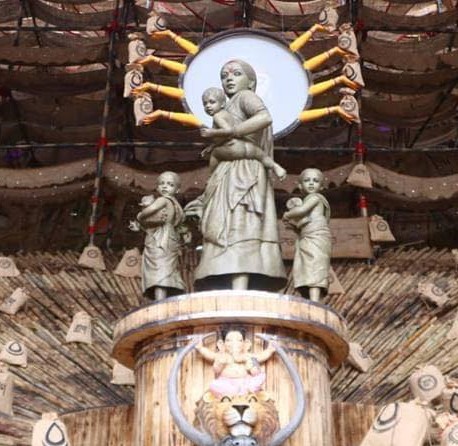(ATF) Every autumn Kolkata braces for its biggest annual jamboree, Durga Puja – a Hindu festival that celebrates the triumph of good over evil. It is often called India’s largest community-driven event as the sprawling eastern city’s streets come alive with boisterous revellers dancing, drumming and thronging the “pandals”- towering temporary structures that display sculptures of the goddess Durga.
Despite the pandemic, court orders banning crowding and repeated warnings by authorities to keep socially distant, yesterday was no different. As the first day of the five-day celebration witnessed the usual waves of revellers throw caution to the wind, the country’s epidemiologists and virologists were losing sleep.
“India has already seen a sharp spike in new cases following the recent festivals in Maharashtra and Kerala, a virologist from The Indian Council of Medical Research told ATF, requesting anonymity since he is not the authorised spokesperson. “West Bengal recorded its highest single-day spike too on Thursday as few followed preventative measures like wearing masks and adhering to social distancing norms.
READ MORE: India reports a high recovery rate despite record new Covid cases
“With a series of festivals around the corner, there is a nationwide fear of cases spiking,” he added.
The state of West Bengal – of which Kolkata is the capital – on Thursday recorded its highest single-day infections; 4,157 new Covid cases with 64 people succumbing to the virus over the previous 24 hours.
Recent spike in cases following the Onam festival in the southern state of Kerala and Ganesh Chaturthi in Maharashtra during August and September added to the virologist’s anxiety.
The Onam festival period saw coronavirus cases rise from 4,000 a day to more than 10,000. That led the Kerala government to invoke a law banning the assembly of more than five people across the state for the entire month of October.
Excited Indians
Durga Puja is followed by the festival Navratri and Diwali meaning October and November could see an even bigger spike in infections, experts fear.
The exuberance is already palpable, with a gauge of consumer interest in socialising during the next few weeks suggesting celebrations will continue despite Covid fears.
Conducted by LocalCircles, a community social media platform, this study found that 23% of the 28,000 respondents across India plan to attend private get-togethers or parties and visit close family and friends.
People who have been confined at home for the last many months due to the pandemic, might now decide to step out and socialise given the high spirits and positive sentiment that this time of year brings, LocalCircles said.
This could lead to an acceleration in the virus’ spread even though a significant 51% said they will not socialise at all.
Businesses cheering too
Expecting consumers whose earnings were relatively unaffected by the pandemic to spend the money they saved during months of lockdowns, Indian businesses are hoping to cash in on the festive spirit.
According to a Reuters report, Indian shops and businesses are stocking up more ahead of this year’s big festival season than at any time in the last five years, on the expectation of more purchases because the months of lockdowns have resulted in pent-up demand.
The Confederation of All India Traders (CAIT) said its 70 million small businesses on average were planning for a buffer stock of around 14% this season compared with last year’s 10%, to ensure they don’t run out of stock should demand surge.
“In the last two months, despite facing a financial crunch, we have been procuring goods in anticipation that in the festive season we will have considerable footfalls,” said Praveen Khandelwal, CAIT’s secretary general. “Our expectation is that this will be the best Diwali for us in at least five years. Naturally, our stocks levels will be as high too.”
Customer arrivals this month have already been the highest in about seven months, hovering around 10 per shop on average – still only about a third of the normal level but expected to rise, Khandelwal said.
Prime minister alarmed
But New Delhi is worried.
In an address to the nation on Tuesday, Prime Minister Narendra Modi said that citizens should not forget that the lockdown may be over but the virus that causes the coronavirus disease is still around.
Citing the example of Western countries, he also appealed for the world’s second-most populous nation not to lower its guard during the festive season.
“Recently, we saw many photos and videos where it is clearly seen that people have stopped taking precautions and are not being careful anymore,” Modi said.
“This isn’t right,” Modi told the country of 1.3 billion that has counted 7.7 million cases so far. “Keep in mind, be it America or countries in Europe, cases declined but suddenly increased again, alarmingly too.”
READ MORE: India fights dual battle as Covid, hunger stalk millions
A day before Modi’s warning, The Calcutta High Court ordered the West Bengal government declare all Durga Puja pandals in the state as no-entry zones. The High Court also directed that no more than 25 people be allowed at a time inside the pandal premises and that their names be displayed on the boards outside.
The Court relaxed the ban a little two days later following fervent appeals.
“Urban areas face a distinct risk of surge in the aftermath of the festive season, going by the visuals of the crowds reported in the media,” Rajib Dasgupta, head of the Centre of Social Medicine and Community Health at New Delhi’s Jawaharlal Nehru University, told ATF.
“The administration as well as in some cases, the courts, have stepped in with detailed advice. There’s both the challenge of implementation as well as whole-hearted adherence by all concerned. The responsibility is clearly with people who need to be responsible more than ever before,” he added.
- With reporting by Reuters
























